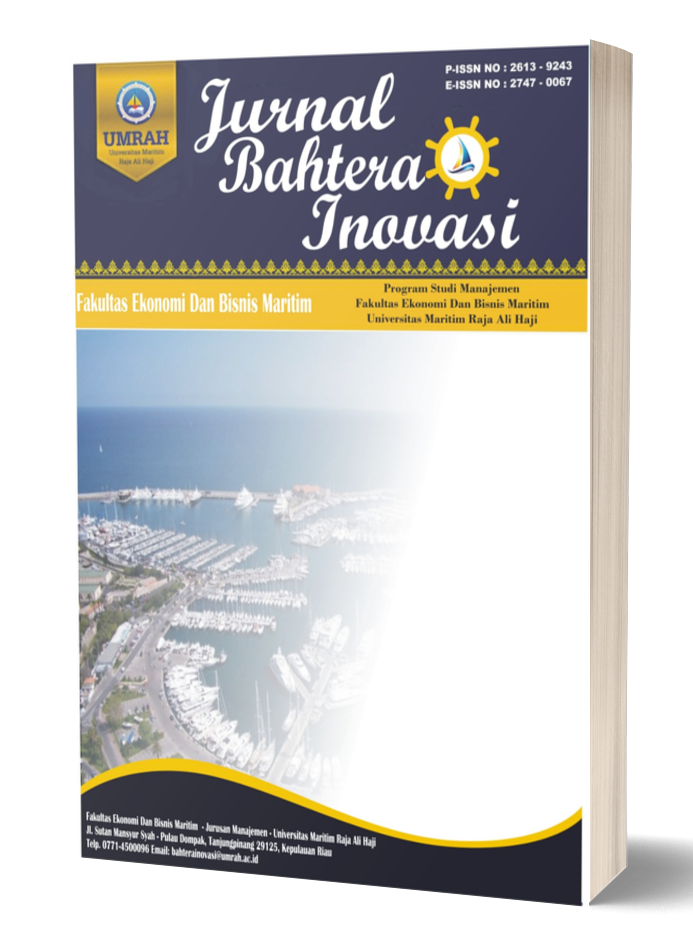Pengaruh Lingkungan Kerja, Insentif, Komitmen Organisasi, Pelatihan, dan Organizational Pride Terhadap Kepuasan Kerja Guru SD di Kecamatan Bukit Bestari Kota Tanjungpinang
DOI:
https://doi.org/10.31629/bi.v6i1.4265Keywords:
Work Environment ; Incentives ; Organizational Commitment ; SatisfactionAbstract
The purpose of this study was to determine the effect of the work environment, incentives, organizational commitment, training, and organizational pride both partially and simultaneously on job satisfaction of elementary school teachers in Bukit Bestari District Tanjungpinang city. In addition, this study also aims to determine the magnitude of the influence given by variable X to variable Y. The method used in this research is a quantitative experimental method by conducting quantitative descriptive analysis. The test data used is the classic assumption test followed by a hypothesis test in the form of a simultaneous test (F test), partial test (t test), and the coefficient of determination test (R2). The results showed that, simultaneously had a significant effect on job satisfaction of elementary school teachers in Bukit Bestari district, Tanjungpinang. But partially, the work environment has no effect on teacher job satisfaction while incentives, organizational commitment, training, and organizational pride significantly influence teacher job satisfaction. the training factor has the most dominant influence on teacher job satisfaction. The influence given by variable X to variable Y was 96.70% while the rest around 3.30% was influenced by other factors.
Downloads
Downloads
Published
Issue
Section
License
Copyright (c) 2022 Bahtera Inovasi

This work is licensed under a Creative Commons Attribution-NonCommercial-ShareAlike 4.0 International License.
Anda diperbolehkan:
- Berbagi — menyalin dan menyebarluaskan kembali materi ini dalam bentuk atau format apapun;
- Adaptasi — menggubah, mengubah, dan membuat turunan dari materi ini
- Pemberi lisensi tidak dapat mencabut ketentuan di atas sepanjang Anda mematuhi ketentuan lisensi ini.
Berdasarkan ketentuan berikut:
- Atribusi — Anda harus mencantumkan nama yang sesuai , mencantumkan tautan terhadap lisensi, dan menyatakan bahwa telah ada perubahan yang dilakukan . Anda dapat melakukan hal ini dengan cara yang sesuai, namun tidak mengisyaratkan bahwa pemberi lisensi mendukung Anda atau penggunaan Anda.
- NonKomersial — Anda tidak dapat menggunakan materi ini untuk kepentingan komersial .
- BerbagiSerupa — Apabila Anda menggubah, mengubah, atau membuat turunan dari materi ini, Anda harus menyebarluaskan kontribusi Anda di bawah lisensi yang sama dengan materi asli.
- Tidak ada pembatasan tambahan — Anda tidak dapat menggunakan ketentuan hukum atau sarana kontrol teknologi yang secara hukum membatasi orang lain untuk melakukan hal-hal yang diizinkan lisensi ini.
Pemberitahuan:
Anda tidak perlu menaati lisensi untuk bagian materi ini yang telah berada di bawah domain publik atau untuk penggunaan yang diizinkan di bawah pengecualian atau pembatasan .
Tidak ada jaminan yang diberikan oleh lisensi ini. Lisensi ini mungkin tidak memberikan izin yang sesuai dengan tujuan penggunaan Anda. Sebagai contoh, hak-hak lainnya seperti hak atas potret, hak atas privasi, atau hak moral dapat membatasi penggunaan materi berlisensi CC.















